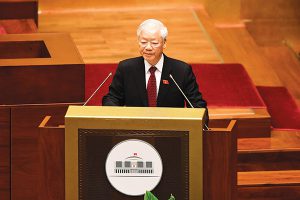Bloomberg
Over the past few years, Vietnamese Communist Party Chief Nguyen Phu Trong has won praise from investors for removing corrupt officials. Now as some big names fall, it’s becoming clear his campaign serves another purpose: strengthening his hand in choosing a successor.
This week Nguyen Xuan Phuc was ousted as president after assuming “political responsibility†for the “violations and shortcomings†involving two graft cases related to a manufacturer of Covid-19 test kits and repatriation flights.
Phuc — a familiar face to foreign investors who oversaw a booming economy as prime minister — was once seen as a strong contender to take over from Trong, who has been in the role since 2011.
But at a party reshuffle two years ago, Phuc lost out and was put in the largely ceremonial role as president. Trong, 78, kept his job for an unprecedented third term but failed to position his preferred conservative candidate as successor, all but assuring a leader from a rival faction seen as more reformist would one day take power.
Phuc’s ouster now opens the door for Trong to line up a successor to run Vietnam, which has recently attracted investment from companies leaving China and improved relations with the US. The battle will take place in the run-up to a mid-term plenum in April, when a new Politburo member will be announced and there’s a chance the president may be revealed then. Usually the president is named in May after the National Assembly votes.
“There’s definitely an element of conservatism in Trong because he sees the threat from those in government who are more directly involved in business,†said Linh Nguyen, lead analyst for Vietnam at Control Risks. “He has felt the need to reorganize the party to strengthen party ideology and not let those who make decisions in business policies hold important party positions.â€
 The Gulf Time Newspaper One of the finest business newspapers in the UAE brought to you by our professional writers and editors.
The Gulf Time Newspaper One of the finest business newspapers in the UAE brought to you by our professional writers and editors.
